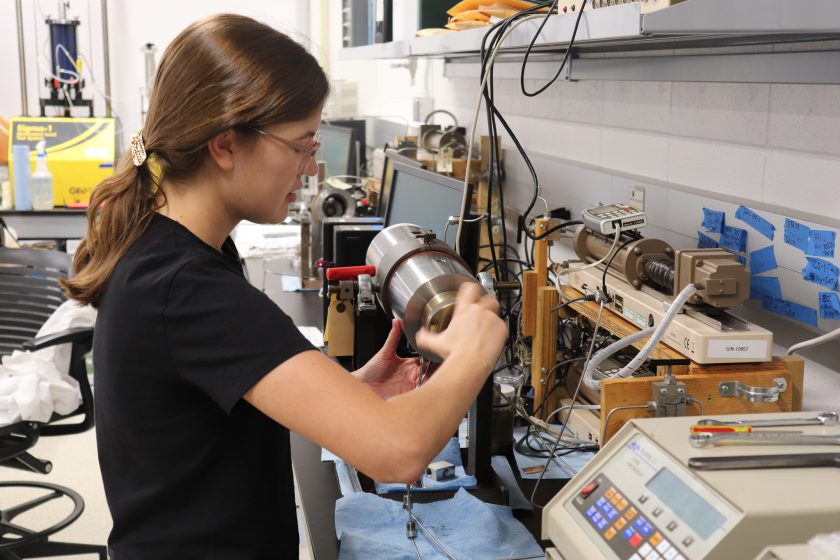What We Do
We address fundamental research questions that underpin geohazards, Earth resources, and the carbon cycle, through learning about our planet’s crust and the processes that shape its surface and climate. Our research combines field measurements, lab analysis, and computer modeling to understand the Earth.
Why do rocks and fluids matter?
Earthquake nucleation and recurrence, the entrapment of carbon dioxide, submarine landslides, permafrost melting and energy production are all influenced by the interaction of fluids and rocks.
Join Our Team!
Explore our opportunities for students, postdocs and research collaborators.
Who We Are
Principal Investigators
Got questions or want to know more? Email our faculty Peter Flemings or Demian Saffer and start a conversation today.
Peter Flemings
Professor, Department of Earth and Planetary Sciences, Jackson School of Geosciences Research Scientist, University of Texas Institute for Geophysics Leonidas T. Barrow Centennial Chair in Mineral Resources
Demian Saffer
Director, University of Texas Institute for Geophysics Professor, Department of Earth and Planetary Sciences, Jackson School of Geosciences Scott Petty Jr. Endowed Chair for the University of Texas Institute for Geophysics
Scientist Spotlight
We are a multidisciplinary team of expeditionary scientists, laboratory experimentalists, geotechnical engineers, computational geoscientists and students.
Alejandro Cardona
Research Associate. Explores the scientific foundations and engineering implications of geomaterials and subsurface processes with an emphasis on the energy sector.
Nicole Ferrie
Graduate Research Assistant. Uses boron adsorption and isotopic fractionation as a fluid tracer in shallow subduction complexes and a proxy for paleoatmospheric CO2 reconstruction in paleosols.
Tanner Mills
Postdoctoctoral Fellow. Multidisciplinary geoscientist investigating thawing permafrost soils in Alaska and the biogeochemistry of methane hydrates in the Gulf of Mexico.
Kaitlin Schaible
Graduate Research Assistant. Former civil engineer now applying rock mechanics experiments to models of earthquake fault zones. Stress-tests rocks to measure subsurface conditions at major earthquake faults.
Featured Research Projects
Earthquakes and Fault Zones
Our lab directs research to investigate the processes and mechanics of fault zones and the earthquakes they generate. Our latest center-piece is the UT Earthquake…
Read MorePressure and Stress in the Earth
Pore pressure, stress, and deformation are coupled. Their interaction controls earthquakes, submarine landslides, and the morphology of continental margins. We explore the coupling between rock…
Read MoreExploring Methane Hydrates
5-22% of Earth’s global organic carbon is trapped in gas hydrate, an ice-like substance composed largely of methane and water. Most of this massive carbon…
Read MoreNews
March 8, 2023
[WATCH] UT Austin lab simulates miniature earthquakes; discovers role ‘healing’ plays in slow earthquakes
AUSTIN (KXAN) – Researchers with the University of Texas in Austin are making some exciting discoveries beneath the Earth’s surface. A paper published in the…
Read MoreMarch 8, 2023
Earthquake Scientists Have a New Tool in the Race to Find the Next Big One
An everyday quirk of physics could be an important missing piece in scientists’ efforts to predict the world’s most powerful earthquakes. In a study published…
Read MoreNovember 11, 2022
Making Quakes in Austin, Texas
By Kristin Phillips. After months spent carefully combining black steel plates, delicate sensors, and five hydraulic jacks into a device that mimics the sliding of tectonic plates past each other, a team of researchers and graduate students successfully made an earthquake in the lab on November 7, 2022.
Read MoreNovember 8, 2022
Scientists Plan Major Research Program to Understand Earth’s Most Dangerous Hazards
The University of Texas at Austin has joined leading scientists on a bold new effort to understand Earth’s largest earthquakes and volcanic eruptions. The plans…
Read MoreOctober 12, 2022
Demian Saffer to Give AGU’s 2022 Francis Birch Lecture
Demian Saffer is to receive the American Geophysical Union’s Francis Birch Lecture, an award that recognizes significant contributions to the study of the Earth’s interior…
Read More